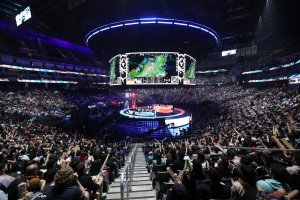In the dynamic realm of esports, Riot Games stands at a pivotal juncture, balancing the tangible warmth of a live audience against the cold, hard numbers of viewership. This dichotomy has been especially pronounced during the Covid-19 pandemic, which, paradoxically, has both bolstered and burdened the industry.
The Essence of Ticketing in Esports
Ticketing, a seemingly straightforward concept of selling event tickets, has been undervalued, particularly in the context of Riot Games’ League of Legends EMEA Championship (LEC) and Worlds events.
The company’s recent decisions, including the surprising rejection of Barcelona as a Worlds venue, underscore a missed opportunity in leveraging this valuable revenue stream.
Barcelona’s Missed Opportunity
Barcelona’s exclusion as a Worlds host city is a significant loss. The city, having successfully hosted the 2016 All-Star event, demonstrated its capability to bridge the gap between esports professionals and their audience.
The reasons behind Riot Games’ decision remain shrouded in mystery, raising questions about the underlying dynamics between the company and local entities.

Rising Spanish Influence in the LEC
The LEC’s inclusion of three Spanish clubs in 2024, such as Karmine Corp, highlights a shift in audience engagement strategies. These clubs, known for their mass appeal, play a crucial role in sustaining interest in the competition. However, the absence of Barcelona as a host city means missed local engagement opportunities with these influential organizations.
The Berlin Victory and Its Limitations
Berlin’s selection as the LEC venue, featuring the Riot Games Arena, is a mixed blessing. Despite its revamped design, mirroring the aura of the VALORANT Champions Tour (VCT), its capacity limitations raise concerns about accommodating a large live audience. The balance between fan engagement and venue capacity remains a critical challenge for Riot Games.
Ticketing Beyond Europe: The World Stage
Ticketing issues extend to the global stage, with the Play-In and group stages of Worlds being held in relatively smaller venues. This approach, while economical, may undermine the potential for larger fan experiences and long-term revenue generation through ticket sales and associated activities.

The Bigger Picture in Esports
At the core of esports lies the relationship between game developers and their audience. Numbers on platforms like Twitch are important, but they don’t fully capture the essence of fan engagement.
Riot Games, through its ticketing strategy, has the opportunity to foster a more holistic approach, encompassing commercial exploitation, B2C and B2B initiatives, fan experiences, and peripheral sales.
Ticketing Challenge: Bridging Esports Audiences and Revenue
Riot Games, at the forefront of esports, must navigate the complexities of ticketing with a nuanced understanding of its audience’s needs. The challenge lies not just in selling tickets but in creating immersive, memorable experiences that resonate with fans and contribute to the sustainable growth of the esports ecosystem.

